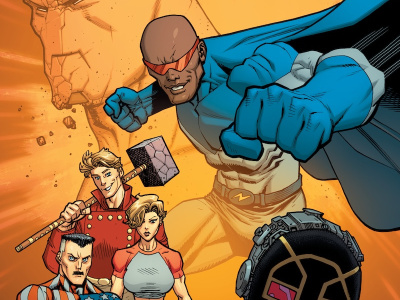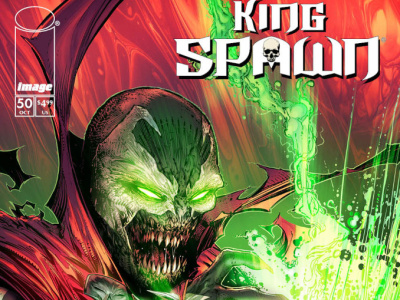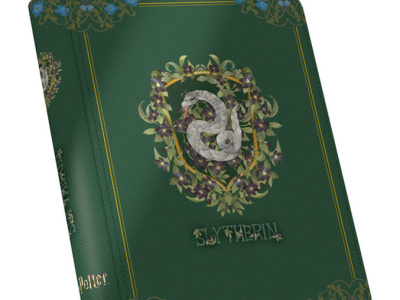UK-based Titan Entertainment has a long history and broad business portfolio that’s invisible to many people in the business, who are only familiar with its recent expansion of comics and graphic novel publishing. We recently sat down with Titan Entertainment Group Managing Director Nick Landau and Executive Director Vivian Cheung to explore some of that history for our readers, and to understand the scope of the company’s activities and ambitions. In Part 1 of this two-part interview, we talk about the roots and expansion of Titan’s publishing operations. In Part 2, we talked about Titan’s merchandise division, the current shape of its publishing, upcoming expansion, and its retail stores.
People in the business now may know what you’re doing, but don’t know how you got here. There was a distribution company, years ago, then a store. And publishing. At some point you bought out your partners.
Landau: We bought out the partners in 1993 and formed the Titan Entertainment Group, which is a 50% co-owned business, Vivian and myself. We don’t have any shareholders, just the two of us.
Were you publishing then?
Landau: We’ve been publishing since 1981. In 1981, after a stint on 2000 A.D., I set up Titan Books to publish a whole range of 2000 A.D. and Judge Dredd graphic novel collections, and in ’94 came into the U.S. market. The first books were actually distributed in the U.S.
Cheung: You have to remember that Nick was 2000 A.D. editor before that. He was the second Tharg [2000 A. D.’s fictional editor] and also wrote some of the comic strip, too.
Landau: We had distribution through the Direct Market from 1981 through Sea Gate Distributors, through this company called Capital City Distribution based in Madison, Wisconsin, and through Bud Plant as well. I’m not sure Diamond was even around. So we go back right to the beginning of the Direct Market. And in fact the original distribution business was called Comic Media Distribution Service, which in 1979 we rebranded as Titan Distributors. Some years before, Phil Seuling set up the Direct Market by going to DC and Marvel. I and a few others had been encouraging him to get into this marketplace.
He had been talking about it. He said ‘I have this great idea, to do this.’ The moment he said this, he opened the floodgate of a number of us saying it was a fantastic idea. Years later, after he struck the deal with Marvel, we became his first international account and became the first [U.K.] comic book distributor. Having said that, we were actually distributing comics before the Direct Market into the U.K. market. So our credentials go way back.
After the 2000 A.D., you did DC and Dark Horse collections for the U.K. market, right?
Landau: Actually, the next thing that happened was Eagle Comics in 1984. It was a giant venture with IPC Magazines. We took 2000 A.D. and Judge Dredd into the U.S. market. We sold 100,000 copies of the very first Judge Dredd comic in 1984.
Then, in 1986 we became DC’s U.K. publisher. We started out with The Dark Knight Returns, and later went onto Watchmen and Killing Joke. At that stage, DC actually stopped doing graphic novels and we thought well we’ve actually established a very good market in the U.K. for graphic novels but there are no more graphic novels coming. So we ended up creating a number of our own, utilizing DC Comics books from Europe. We had titles like Swamp Thing and we would create graphic novels out of Alan Moore’s material. We would get writers like Clive Barker, Ramsey Campbell and Frank Herbert to write the introductions. As a result of getting those introductions written, we managed to get very strong reviews in the trade press because they’d never heard of Swamp Thing and Alan Moore. So we got the Guardian and The Times and all these newspapers were starting to review us. So we actually established a graphic novel market sort of independent, oddly, in the U.K.
So at some point in the aughts or early teens, it seemed like Titan made the decision to really ramp up its publishing operation. Why did you decide to expand?
Landau: We’ve been a licensed publisher since the early 80s. We were a licensed publisher in the U.K. starting out with Star Trek fiction. We have a pretty continuous run of having fiction and illustrated book licensing. We took on licensed books, TV, and fiction. The gap was licensed comic book fiction, and we decided a few years ago that we should play to one of our great strengths as a business, which was our love of comics.
We had a magazine division that was producing licensed magazines. We’ve pretty much done every TV property and a number of movie properties over the years.
Was that for the U.K. market, or for North America?
Landau: Initially for the U.K. market and then laterally for the U.S. market. I think it was sometime in the early 90s that we stopped being exclusively U.K. and broadened our magazine publishing into the U.S. as well. Because we had a very good knowledge of how the U.K. newsstand worked, it was natural that we developed that into the U.S. side as well. So we became a newsstand publisher in the U.S. and our first publication, I think, was Babylon 5 and then we followed it up pretty closely with Buffy and Angel. So we just built up a business with licensed magazine publishing.
Ironically, all the editors that joined us for licensed magazine publishing had a great love of comics, as Vivian and I do. So it was very natural to us to migrate that into comic book licensed publishing. We already had the expertise from the magazines, fiction and the illustrated books. So fast forward another 10 or 15 years, and a few years ago we came to the conclusion that we really wanted to become comic book publishers in the U.S. market.
We’d been doing newsstand U.K. licensed comics like Star Wars and Transformers. We had been producing our own content for the U.K. market for a younger age group. So would have IDW doing the U.S. market for Transformers, and Dark Horse, at the time, doing Star Wars publishing, but they were producing content for an older age group. We were producing content in the U.K. for a younger age group, for the newsstand market. They’re two quite different marketplaces and a lot of the foreign language countries wanted this younger material. So we were creating material for the U.K. market and then sublicensing that out to foreign language territories in the same way they were if people wanted the older material. We were running a parallel business through the two English-speaking markets. So we had a natural inclination to produce comics.
We had a knowledge of how to do kids comics and we had a passion for older age group comics. Our first comic books came out through Titan Books, ironically. Those were titles like Lenore. They came out of our graphic novel division which was in Titan Books at the time, and then when we set up Titan Comics U.S., everything migrated to Titan Comics in 2013. I think one of the first migrated titles was Lenore or Tank Girl.
You were doing some classic collections too, like the Simon and Kirby collections in the aughts also.
Landau: And we did Icon Jim Lee. Through the books division, in the same way that we were doing licensed film and TV publishing, we were also doing comic collections. We had a very long history. I think over the time we published over 2000 DC graphic novels in the U.K. as well as representing a lot of other U.S. publishers.
When Titan Comics was formed you were doing licensed and creator-owned, and when did you start doing French material?
Landau: The French material actually started back in the 80s. We were working with Bernd Metz, of Catalan Communications. We had a partnership with Bernd, so pretty much everything he published in the U.S., we published in the U.K. and the rest of the world. We did the same with Marvel back in the day, we published Moebius.
Was there a gap of doing French material between then and now?
Landau: Oh, yes. This recent run started up around 2013. Snowpiercer was the first one. We identified that as being an interesting project.
A lot of people have tried to sell BD in the U.S., with some having more success than others. In the past, BD wasn’t the most robust part of the market, why did you decide to do that?
Landau: Passion. Basically I’ve been a collector of French BD forever. That’s how I learned French (although a lot of people wouldn’t necessarily say that I’ve learned French). We were doing it back in the 80s and when the opportunity came to do it again, we leapt at it. And I think we’re quite well positioned in the U.K. to broach that gap between the U.S. and the French markets. Geographically it’s a great place to be and also logistically we felt we could really bring something to the table.
We had a lot of knowledge about French BD. We had published all the classic material back in the day and we had been following all the new material as it had come through. The only thing we hadn’t done was press the button to start publishing.
You’ve added a lot of art books in the last couple of years.
Landau: That goes back further than that. Halo was one of our early art books.
In the aughts. But it’s fair to say you’re doing a lot more now?
Landau: We’re doing a lot more.
We’ve been doing film and TV art books since Dick Tracy. Two of our first were Dick Tracy and the original Independence Day. We’ve continuously been doing movie art books and television art books since those films came out. We decided to add gaming because we had a lot of passionate gamers in the business. They asked ‘why aren’t we doing gaming books?’ and we asked ourselves, ‘why weren’t we doing gaming books?’ and realized that we had a real affinity for doing it because we had great editors who were passionate about the projects.
Click here to go to Part 2.

Titan's Publishing Roots and Expansion
Posted by Milton Griepp on September 16, 2016 @ 4:14 am CT
MORE COMICS
Remastered Originals Followed by All-New Series
July 29, 2025
Capes will return with remastered versions of the long-out-of-print originals, followed by new stories in the same universe.
From Image Comics
July 29, 2025
Check out the covers for King Spawn #50, coming this October from Image Comics.
MORE NEWS
Featuring the Magical Houses of the Series
July 29, 2025
heo Group unveiled new Harry Potter 4-Pocket Zipfolios.
'Salamence ex & Reshiram ex'
July 29, 2025
The Pokemon Company International will release Salamence ex & Reshiram ex Premium Collection , for Pokemon TCG , into retail.







